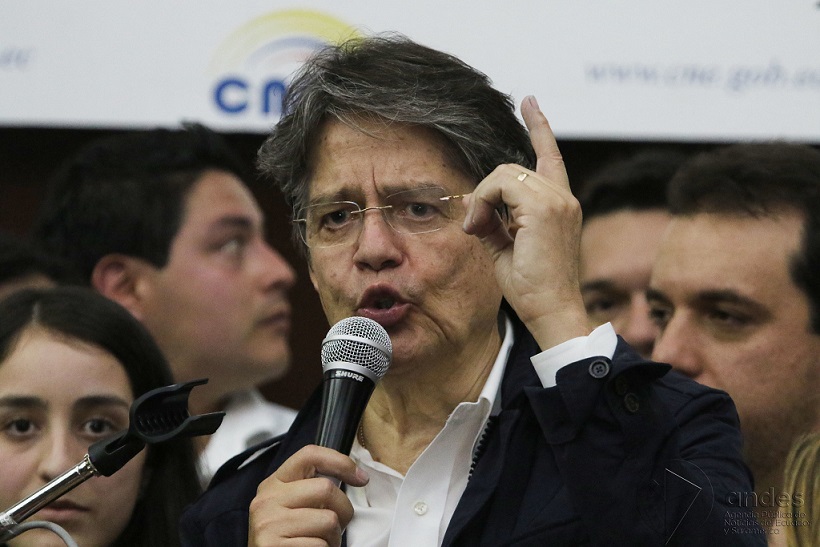Can the handling of the crisis unleashed by the recent earthquake in Ecuador change Guillermo Lasso’s image in the midst of the widespread rejection of his administration, and while the National Assembly processes a possible political trial against him for crimes against public administration?

The earthquake on 18th March could give the government another context in how to manage the crisis, suggested the analyst, Pedro Donoso. In fact, the recently occurring seism could mark a ‘before’ and an ‘after’ in the president’s administration, who today finds himself facing a political trial.
A total of 13 deaths, according to figures corrected by the authorities, more than 400 wounded, 89 homes destroyed and another 192 affected, 112 educational establishments and 40 health centres damaged, six collapsed bridges, among other issues as a result of the magnitude 6.5 quake.
Faced with disaster on such a scale, which also affected national petrol production, the president announced on national television the declaration of a state of emergency to facilitate and accelerate the public contracts for the sake of recovering the affected infrastructure. After an extensive tour over the weekend through the provinces of El Oro, Azuay. Guayas and Santo Domingo de los Tsachilas, Lasso stated that the Treasury has already designated funds to return the affected families back to normality as soon as possible.
He also announced the creation of a “housing rent voucher” for those affected and the arrangement of emergency funds for multilateral organisations to rapidly deliver the necessary resources.
 For Donoso, passing the motion that could speed up the end of Lasso’s government is in the hands of the legislators, this is why he believes that their final approval depends on how the president allows the assembly to meet the needs of the affected provinces.
For Donoso, passing the motion that could speed up the end of Lasso’s government is in the hands of the legislators, this is why he believes that their final approval depends on how the president allows the assembly to meet the needs of the affected provinces.
Nevertheless, the analyst clarified that the situation is turning against Lasso to start to carry out the ambitious plan of investment he announced.
Among these adverse factors that stand in the way of assigning the promised funds, the fall of the price of petrol was mentioned, which will decrease income to the Treasury, the rise of staple food costs due to effects of avian flu, and the effects of the rainy season. It will be necessary in the coming weeks to evaluate if the stakes of trying to reverse the negative perception of his management with an aggressive public investment plan will work, especially in the context of economic weakness, Donoso emphasised.
Social media users say that the earthquake tragedy has done very well politically for Lasso to try to “improve” his image and demonstrate leadership and action to those who need it.
It seems that the head of the Government’s communication team knows this and, since the moment of the tremor, they have taken care to show each one of the governor’s activities, emergency meetings and hospital visits, among others.
 Meanwhile, the steps to advance the process of political trial for crimes against the public administration are continuing and, this Monday, the Legislative Administration Council will decide if the process passes to the Constitutional Court, an entity based on formal aspects which could approve or halt the proceedings. The president reached this point following the scandal that connects his brother-in-law, Danilo Carrera, and civil servants of his government with an alleged corruption network of public companies and apparent links with drug trafficking, specifically with the Albanian mafia.
Meanwhile, the steps to advance the process of political trial for crimes against the public administration are continuing and, this Monday, the Legislative Administration Council will decide if the process passes to the Constitutional Court, an entity based on formal aspects which could approve or halt the proceedings. The president reached this point following the scandal that connects his brother-in-law, Danilo Carrera, and civil servants of his government with an alleged corruption network of public companies and apparent links with drug trafficking, specifically with the Albanian mafia.
While the government denies the accusations and has called them a “coup” and an attempt at destabilisation, social organisations support Lasso’s exit from power, not just because of these crimes, but also due to state abandonment, an image that they are now trying to reverse after the quake.
What is in doubt is whether it will be enough to curb public support for his exit from power.
(Translated by Donna Davison – Email: donna_davison@hotmail.com) – Photos: Pixabay












.jpg)












